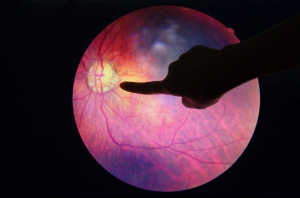Everything You Need to Know About Age-Related Macular Degeneration (ARMD)
Sub Title

As we get older, our eyes can start to develop certain conditions that can affect our vision. One of these is cataracts, and the other is age-related macular degeneration (ARMD). Macular degeneration gradually starts to occur as a result of damage to the macula. As such, annual eye exams are highly recommended after the age of 40 to screen for ARMD and other vision problems.
The macula is the part of the eye that affects central vision when looking straight ahead. When the macula is damaged, you may notice you are having difficulties seeing clearly, which can affect our ability to read, drive, and enjoy other visual activities. Other common symptoms that can develop with ARMD include:
- Objects do not appear as sharp or detailed as they used to be.
- You notice a light sensitivity to bright lights, especially at night.
- You need to use brighter lights focused on specific objects to see.
- Colors look faded and less vibrant than they used to be.
It is worth noting these symptoms are also common when one has cataracts. As such, it can be difficult to diagnose ARMD in people who have cataracts. It is not until after they have cataract laser eye surgery that ARMD is often discovered.
There Are Two Different Types of Age-Related Macular Degeneration
ARMD can be diagnosed as either wet macular degeneration or dry macular degeneration. Dry ARMD is more common than wet ARMD.
Dry Macular Degeneration
Dry ARMD is the initial stage or ARMD. It develops when macular tissues start thinning from age, as well as when deposits from the thinning tissues are left deposited on the macula. It can also be a combination of the two processes.
Another symptom is the formation of yellow-colored spots on and around the macula. The tissues in the macula are sensitive to light. As the tissues thin and degrade, the sensitivity to light increases and gradually becomes more pronounced.
A detailed ophthalmology examination annually is highly recommended to help diagnose ARMD before significant vision loss occurs. The visual loss will continue year after year. Eventually, significant vision loss develops, which could potentially lead to blindness.
Wet Macular Degeneration
Wet ARMD can develop on its own or as a later progression and stage triggered by dry ARMD. The wet form is less common but can cause more severe vision loss. It is caused by blood vessels that are leaking, which grow abnormally just beneath the macula.
As the blood vessels leak out blood and fluid into the eye, it causes scarring to the macula and gradual vision loss. The damage cannot be reversed once it occurs. You may notice the initial effects of wet ARMD if you have developed a blind spot in the center of your vision.
The abnormal blood vessel growth is a response by the body when there are insufficient oxygen and nutrients in the retinas. The body mistakenly grows new blood vessel networks as compensation for the deficiencies and, in the process, creates a situation that can lead to permanent blindness.
Are Dry and Wet Age-Related Macular Degeneration Treatable?
There is currently no known type of treatment for Dry ARMD that can stop the degeneration of the macula. Certain lifestyle changes could potentially help slow the progression of visual loss, such as:
- Eating a healthier, balanced diet
- Taking dietary and nutritional supplements
- Exercising regularly
- Quitting smoking
There is macular degeneration laser surgery currently available for Wet ARMD. This is a newer procedure that attempts to seal the leaking blood vessels and slow the progression of the disease. The laser surgery cannot reverse the effects of visual loss and damage to and scarring on the macula. Lifestyle changes may also help slow the progression of visual loss.
For further information about age-related macular degeneration, including treatment options, please feel free to contact Dougherty Laser Vision at (805) 312-7671 to schedule a telehealth or in-office consultation today!


